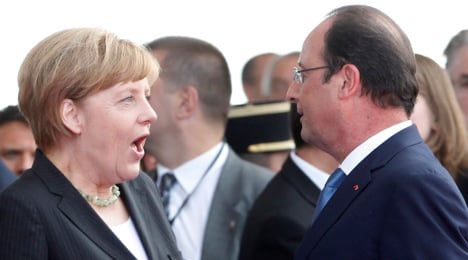Hollande called on Brussels to ease its rules on budget discipline to protect flagging growth in the troubled eurozone.
"We have to adjust budgetary policy in relation to the challenge of growth," Hollande said on his arrival for a brief informal summit with other EU leaders.
The French leader said the issue would be discussed at a full European Council later this month, setting the scene for a head-on clash with German Chancellor Angela Merkel.
Merkel has made it clear she will not countenance any easing of the requirement for EU governments to bring budget deficits under three percent of GDP and to keep them there.
Last week, France announced that it would fail to meet that target until 2017 and ruled out any further spending cuts, effectively publicly flouting the agreed ground rules for the single currency on the grounds that further cutbacks would only slow the faltering economy further.
That message was hammered home here by Hollande. "If everyone imposes austerity, which is not the case of France, there will be an even greater slowdown of growth," the Socialist leader said.
The European Commission is currently considering whether to use new powers it acquired last year to force France to rewrite its controversial budget.
If Brussels knocks back Paris's budget and demands major revisions, as several sources told AFP was likely, it would be a major blow for the bloc's second biggest economy and a founding member of the European Union.
It also complicates things for Pierre Moscovici, the Frenchman whose installation as the new European economics commissioner has been thrown into doubt by his own record as finance minister until March this year.
The European Commission – the powerful executive branch of the EU – was in 2013 granted the power to send back national budgets for revision under new rules adopted to prevent a repeat of the eurozone debt crisis.
The EU said on Monday it had not yet taken any decision, adding that France had until October 15 to submit its budget and then the Commission had a further two weeks to make up its mind.
"It is extremely premature to speculate on content of the opinion we will issue," said Simon O'Connor, spokesman for the Economic Affairs Commission.
In its defence, France would probably insist that it faces "exceptional circumstances", which would then allow it to send up a new offer that still lets it overshoot the EU targets, sources said.
That would not go down well, however, with smaller nations that have had to agree to punishing austerity measures in the past to bring their finances into line with EU limits.
On Friday, sources said it was "highly likely" Brussels would send France's plans back for changes, adding that it would "heighten tensions between France
and Germany."



 Please whitelist us to continue reading.
Please whitelist us to continue reading.
Member comments